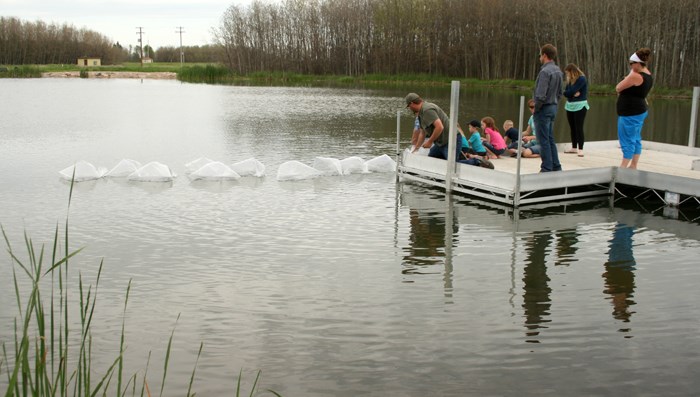Welcome to Week CCXI of ‘Fishing Parkland Shorelines’. Like most of us I am a novice fisherman, loving to fish, but far from an expert. In the following weeks I’ll attempt to give those anglers who love to fish but just don’t have access to a boat, a look at some of the options in the Yorkton area where you can fish from shore, and hopefully catch some fish.
Yorkton fisherfolk are a rather fortunate lot having a City-owned trout pond near the water treatment plant to enjoy.
The area was part of the development of the plant, utilizing wash water from the plant to continually charge the water where the trout have been introduced.
The initial stocking took place in 2014, and many of those fish are still in the water, much larger now than when they first hit the water.
Of course those fish are also a tad more wary too. The area is a catch and release water, so many of the original fish still in the pond will have tasted a hook, and found it less than to their liking, so they are likely a bit more fussy in what they dine on.
How many of the fish from the original stocking remain is unknown, although predation by birds, natural loss and some deaths by poor fisherfolk handling have no doubt reduced the numbers.
No worries though. The long term viability of the pond for fishing was bolstered last week.
Derrick Little from the local Wildlife federation and Jesse Nielsen manager of the Assiniboine Watershed Stewardship Association released 500 six-inch rainbow trout into the Logan Green Pond.
It is likely something which will be required every couple of years to maintain stocks, and the local SWF branch appears dedicated to funding the effort, which is great support for a pond which is a wonderful little bit of nature close at hand in which to seek out a feisty fish.
Invasive species
The Governments of Saskatchewan, Alberta, British Columbia, Manitoba and the Yukon Territory have signed an agreement to form a co-ordinated regional defence against invasive species, with an initial focus on aquatic invasive species.
I have wrote previously about the issue of aquatic invasive species, with the current focus being on zebra and quagga mussels, which are a threat to the health of western Canada’s aquatic ecosystems.
If the mussel species are able to become established, they have the potential to dramatically “impact aquatic habitats, recreational and commercial fisheries, valuable recreational resources and water-related infrastructure,” notes a Saskatchewan government release on the new agreement.
“Preventing the introduction and spread of aquatic invasive species requires the collaboration and co-operation amongst many agencies, organizations and jurisdictions,” Saskatchewan Environment Minister Herb Cox said in the release. “As part of Canadian Environment Week, we are pleased to announce this agreement as one of the many actions being taken to ensure a healthy environment for all to enjoy.”
The agreement increases co-ordination between jurisdictions in western Canada, resulting in shared resources and planning related to both prevention and response to aquatic invasive species.
Collaborative activities will include:
· planning of watercraft inspection stations to maximize efforts on shared highway crossings; and
· increased ability to connect with resources from other provinces, such as people and expertise, to assist in a rapid response in the event of any mussel detections.
Saskatchewan supports several other initiatives that raise awareness about aquatic invasive species and the importance of prevention through the CLEAN, DRAIN, DRY Your Boat awareness program.
More information about fishing and aquatic invasive species can be found in the Saskatchewan Anglers’ Guide, and online atwww.saskatchewan.ca/environment.
Endangered Piping Plovers count
I had meant to get to this tidbit earlier, but space is always an issue for column writers, so it was set aside a couple of times, but since shorebirds are one of the ancillary joys of fishing it is worth noting.
From June 4 to 17, over 100 volunteers were busy visiting some 200 lakes and alkali flats across Saskatchewan to locate endangered Piping Plovers.
Saskatchewan is one of the last strongholds for the Piping Plover in the Great Plains.
“Of the 2,200 birds, recorded in the 2011 census, 775 Piping Plovers were recorded in Saskatchewan alone; this accounts for 34 per cent of the Northern Great Plains Population, related a release prior to the start of the count.
“The census allows us to determine population size and monitor population trends; to understand site use and habitat availability; to identify potential threats; and to measure recovery program successes” said Al Smith, Saskatchewan Coordinator for the 2016 International Piping Plover Census in the release. “We will be searching for plovers at all water basins where they have been reported in the past, as well as those where suitable beach habitat has been identified.”
“This is a particularly important year for the International Census” Smith added. “Following years of flooding and all time low numbers in the 2011 census, it is critical we see the numbers bounce back.”
Nature Saskatchewan coordinated the Saskatchewan portion of the international census with sponsorships from: the Government of Canada – Environment Canada, Saskatchewan Environment’s Fish and Wildlife Development Fund, TD Friends of the Environment Foundation, Saskatchewan Minerals, Bird Studies Canada – Baillie Fund. Help in conducting the census is provided by the Canadian Wildlife Service, Saskatchewan Watershed Authority, Saskatchewan Environment, Ducks Unlimited Canada, Nature Conservancy of Canada, Government of Alberta, Agriculture and Agri-Food Canada, and many dedicated volunteers.




